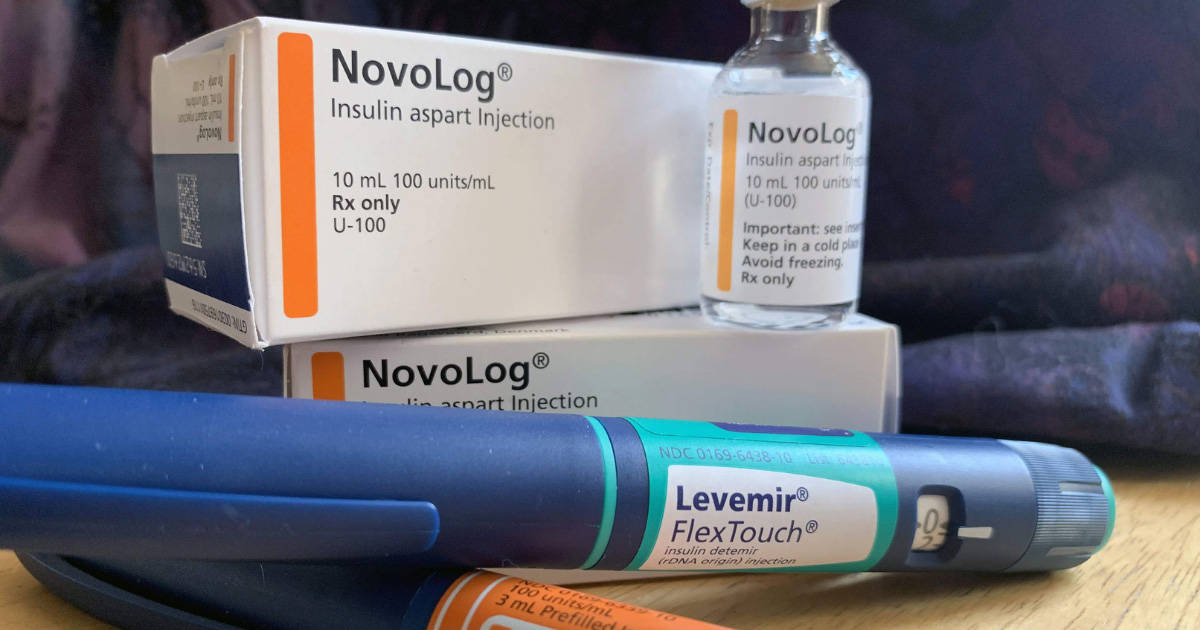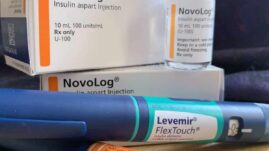This post may contain affiliate links. Please read our disclosure.
If you live with insulin-dependent diabetes, you know that insulin is a lifeline and that having 24/7 access to this life-saving and life-sustaining medicine is absolutely crucial.
But there are times when you may run out: for instance, if you’re traveling and you didn’t pack enough, your insulin spoiled in hot weather, your last bottle of insulin shatters, your prescription has expired and you can’t reach your physician, or even if you’ve been rationing your medications due to cost and you don’t have any left.
This is a terrifying reality for many people who take insulin: a recent Yale study reported that over 1 in 4 people has rationed their insulin due to cost alone in the United States.
This article will outline what you should do if you find yourself in a situation where you’ve run out of insulin.

Seek help immediately
Running out of insulin is a matter of life and death. If you have completely run out and cannot get insulin, the safest thing to do is to seek medical attention from an urgent care clinic or visit your local emergency room.
While doctors there will not know your exact treatment plan, medical professionals can help get you immediate insulin in the form of an IV (this is especially crucial if your blood sugars are skyrocketing, putting you at greater risk for diabetic ketoacidosis).
Once you are stabilized, you can proceed to get a more longer-term solution in place.
Call your pharmacy
Insulin prescriptions lapse. People forget to renew them; we’re only human. People in the United States need fresh prescriptions every year, even if they live with a chronic disease, and that includes people with diabetes.
If you have a prescription for insulin that is over a year old, it cannot be filled anymore, and the standard operating procedure is an appointment with an endocrinologist for blood work, and check-up, and a fresh prescription.
If this is not an option, call your pharmacy, who can most likely call your doctor for you to renew the script seamlessly, as long as you call the pharmacy during their normal business hours.
If the pharmacist cannot reach the physician, but you live in Ohio, Florida, Arkansas, Arizona, Illinois, Wisconsin, Idaho, Oregon, Pennsylvania, South Carolina, Tennessee, Colorado, Indiana, Kentucky, Oklahoma, Utah, or West Virginia (as of 2019), you can take advantage of legislation that has passed called Kevin’s Law, where a pharmacist is able to distribute up to 30 days of a medication under emergency authorization from an expired prescription (usually once per year).
Be sure to stress the urgency of the situation to the pharmacist and refer to the statute when trying to access this benefit.
Tell friends and family
Whatever you do, do not keep your suffering to yourself. Let friends and family know that you’ve run out so that you can think through solutions together.
Perhaps someone can loan you money to buy insulin over the counter. Perhaps you have a friend of a friend who lives with insulin-dependent diabetes and can spare a vial or pen.
Utilize social media with your need, and the diabetes online community (found on Twitter under the hashtag #insulin4all) can help you as well. Crowdsource funding and ideas to make sure that you can get insulin as soon as possible.
Use ReliOn insulin as a last resort
While not ideal (and sometimes this can even be dangerous), if you cannot crowdsource, reach your physician, or get emergency medical attention, Walmart does sell human insulin for $25 per vial without a prescription and without insurance.
This insulin was developed in the 1970s and 1980s and is called Novolin ReliOn Insulin (comes in Regular, NPH, and a mixture of the two called 70-30) that can be used in a pinch to potentially ward off diabetic ketoacidosis (DKA).
Regular insulin is an older alternative for fast-acting insulin like Novolog or Humalog. NPH insulin is an older alternative for long-acting insulin like Lantus or Tresiba.
However, these insulins act differently than more modern, analog insulins, and food and carbohydrate counting must be carefully calibrated to the insulin (instead of the other way around), and many people struggle when making the transition to this form of insulin.
One example of the difference is that NPH insulin is usually taken every 12 hours, in comparison with Lantus or Tresiba which are both usually taken once daily.
Because of these differences, it’s important that you closely monitor your blood sugar while using it.
It’s best to create a game plan for these types of insulin with your physician before you need it, as part of emergency planning. Talk with your doctor to learn more.
How to guard against running out of insulin
While this scenario is not 100% preventable, there are some strategies you can implement to help prevent this situation from happening to you. These include:
- Always pack triple the amount of insulin you will need for a trip or vacation
- Utilize mail-order-pharmacies that allow you to receive 90 days supply of insulin at once, instead of refilling a prescription every 30 days
- Invest in insulin vial protectors to prevent shattering if you drop your medicine on a hard surface
- Have an emergency plan in place with your doctor for how to use Walmart insulin if you’re ever in a pinch
- Know exactly where your nearest Urgent Care and Hospital are (both at home and at vacation destinations), should you ever need immediate assistance
- Keep up to date on your insulin prescriptions
- See if you live in a state with Kevin’s law or other patient protections in statute
- Save up an emergency fund for insulin money, if you ever need to pay out-of-pocket for a vial
- Keep your insulin cool while traveling, to prevent spoilage
- Cultivate a support system of friends, family, and fellow diabetics who can potentially help you out if you’re ever caught in this situation
Running out of insulin is a terrifying, life-threatening situation that no one ever deserves to find themselves in. Hopefully implementing these strategies can both help you if or prevent you from finding yourself in this situation in the future.





Jane cerullo
Quite awhile ago i was in Massachusetts (I live in Arizona) and my pump ran out of insulin. Turns out the vial fell out in my daughter’s car when driving to airport. Only needed a small amount as I was leaving the next day. I went to CVS and they wanted $650 for a vial. I am an RN so I went to an ER as I knew they would have to help. The pharmacist was wonderful. Managed to get emergency prescription from my Endo. Had to pick up at a grocery store so they didn’t make any $. Did notice the before insurance amount was $320. Lot less than CVS.
Dave
I am almost out of my Humalog pen and the pharmacy won’t refill it until 17 Feb 24. Today is 26 January 24. I have Lantus. My doctor cannot be contacted due to vacation and no one covers for him. I guess my only option until 17 February 2024 is to literally each only protein until I can get my short acting insulin. Do you think this will work out ok for me? I can do this as I have the willpower. I’m 5’ 9.5” in height and weigh 160 pounds so weight isn’t an issue. I’ve began working out where I’m burning 600 Cala per 30 minutes. Should I be ok?
Christel Oerum
You need your Humalog. Try asking your pharmacy to fill it as a vacation override. Or do you have another doctor, like a primary care doctor? I’ve had mine prescribe me insulin when it was too complicated to get in contact with my endocrinologist. Your insurance might also give you (often free) access to a telemedicine visits. And if all that fails you might be able to get a prescription through an urgent care facility.